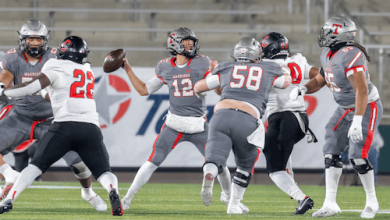Mike Elko is building a strong, disciplined culture at Texas A\&M, emphasizing accountability, toughness, and player development across the program.

When Mike Elko was announced as the new head football coach at Texas A&M in late 2023, the hire came with a clear message: culture matters. After years of lofty expectations and inconsistent results under former coach Jimbo Fisher, the Aggies were in need of a reset—not just in terms of strategy, but in the very foundation of what the program stood for. Enter Elko, a coach known for his no-nonsense leadership style, defensive expertise, and ability to build disciplined, cohesive football teams.
In just a short span, Elko has begun reshaping the culture in College Station. From changing the tone in the locker room to recalibrating the team’s on-field identity, his approach has emphasized accountability, toughness, and player development. As Texas A&M looks to re-establish itself as a contender in the SEC and on the national stage, Elko’s cultural overhaul may prove to be the most important piece of the puzzle.
The Return of a Familiar Face
Before becoming Texas A&M’s head coach, Mike Elko served as the Aggies’ defensive coordinator from 2018 to 2021 under Fisher. During that tenure, he built one of the SEC’s most respected defenses, turning raw talent into disciplined units that ranked near the top of the conference in key categories. His impact was particularly evident in 2020, when the Aggies finished 9–1, narrowly missing the College Football Playoff and earning a No. 4 final ranking.
After a two-year stint as the head coach at Duke, where he engineered one of the nation’s most impressive turnarounds, Elko returned to College Station with a broader vision—and the experience of leading a program. His familiarity with Texas A&M’s infrastructure and expectations gave him a unique head start in building trust and implementing change.
Building from the Inside Out
Elko’s cultural transformation at Texas A&M has begun from within. One of his first priorities was establishing clear standards for player behavior, effort, and accountability. In his own words: “You can’t build a winning program without building winning habits. That starts with how we prepare, how we treat each other, and how we compete every day.”
This philosophy has been evident in team meetings, practice habits, and even player evaluations. Elko has emphasized personal responsibility across the roster, pushing players to take ownership of their development and their role on the team. Off-field accountability—class attendance, nutrition, strength training, and film study—has become just as important as on-field performance.
“We’re not chasing stars or hype,” Elko said during spring camp. “We’re chasing consistency, discipline, and improvement.”
The Return of Physical Football
One of the most noticeable changes under Elko has been the renewed emphasis on physicality and defensive toughness. While Texas A&M recruited extremely well under Fisher, the team often lacked a consistent edge in physical contests. Elko, a defensive-minded coach at his core, has made it a priority to re-establish that identity.
Spring practices were characterized by a more intense, fundamentals-focused approach. Tackling drills, gap integrity, and physical line play were stressed heavily—elements that sometimes took a backseat in previous seasons. Players and coaches alike commented on the elevated energy and attention to detail.
“We’re going to be a team that plays with physicality and purpose,” defensive lineman Shemar Stewart said. “Coach Elko sets that tone every day.”
Offensively, Elko brought in experienced coordinator Collin Klein to create a balanced, efficient attack that complements the defense. While the scheme may evolve, the underlying theme remains the same: play disciplined, tough football that wears opponents down over four quarters.
Leadership from the Top
Elko’s leadership style contrasts with that of his predecessor. Where Fisher was often animated and controlling, Elko is more reserved, calculated, and collaborative. He empowers his assistant coaches and encourages leadership among players, especially upperclassmen.
Team captains are selected based on performance, effort, and character—not just star power. Seniors and veterans are expected to model behavior for younger teammates. This approach has created a sense of ownership within the locker room.
“There’s no confusion about what Coach Elko expects,” said quarterback Conner Weigman. “He’s honest, direct, and he holds everyone accountable—including himself.”
One of the most impactful moves Elko made early in his tenure was instituting regular leadership council meetings. These sessions give team leaders a voice and promote open dialogue about the state of the program, areas of improvement, and how to handle challenges.
Recruiting with Character and Fit
While talent acquisition remains crucial in the SEC, Elko has refined Texas A&M’s recruiting strategy to emphasize cultural fit. High-character athletes who embrace discipline, compete hard, and buy into team-first values are now the top priority—even if they’re not ranked in the top 50 nationally.
This shift has been evident in the Aggies’ 2025 recruiting class, which is quietly rising in the national rankings. The class includes several high-upside prospects who may not have received as much national attention but have earned rave reviews for their work ethic and coachability. Elko has also expanded recruiting efforts into under-scouted regions, trusting his staff’s evaluations and development track record.
“We’re not recruiting hype—we’re recruiting foundation,” said recruiting coordinator Elijah Robinson. “We want players who fit who we are and who we’re becoming.”
This more strategic and disciplined approach is already showing results. Texas A&M has had fewer decommitments and recruiting drama than in previous cycles, reflecting a more stable and targeted effort.
A Cultural Reset for the Fan Base
Texas A&M has long possessed one of the most passionate fan bases in college football. Yet that passion has at times turned to frustration, particularly when expectations failed to align with results on the field. Elko has made it a point to rebuild the relationship between the program and its supporters.
In the offseason, Elko and his staff prioritized community engagement—holding open practices, attending alumni events, and making media rounds to promote transparency. He’s also encouraged current players to be more involved in campus life and to represent the program with pride.
“There’s a pride that comes with wearing this jersey,” Elko told fans at the Maroon & White Spring Game. “We’re going to earn your support by doing things the right way—every single day.”
So far, the approach is working. Attendance at offseason events has increased, and optimism about the direction of the program is rising. More importantly, there’s a growing belief that the Aggies are building something sustainable—not just chasing short-term headlines.
Player Development: The Core of Elko’s Vision
More than any recruiting win or flashy hire, Elko’s long-term success at Texas A&M will hinge on his ability to develop players. This, he believes, is where the biggest cultural shift needs to occur. “It’s not just about signing great athletes,” Elko said. “It’s about turning them into great football players and great young men.”
Elko has revamped the player development pipeline at every level. Strength and conditioning programs now prioritize injury prevention, mobility, and position-specific functional strength. Nutrition and recovery protocols have been upgraded, and the coaching staff has placed greater emphasis on technique refinement and individualized growth plans.
Early returns are promising. Several players who previously struggled with inconsistency or injuries have shown noticeable improvement under the new regime. Redshirt freshmen and sophomores are being given real opportunities to compete for playing time based on performance—not reputation.
Discipline Over Flash
In a college football era dominated by social media, NIL deals, and branding, Elko’s approach is a throwback to a more traditional coaching model—focused on discipline, cohesion, and team-first mentality. While Texas A&M still supports its players in maximizing NIL opportunities, Elko has drawn a clear line between personal brand-building and team priorities.
“No one here is bigger than the team,” Elko stated plainly. “You can be successful individually, but it has to happen within the structure of what we’re building.”
This attitude has helped foster a tighter-knit locker room, where ego takes a backseat to effort and respect. Players have reported a stronger sense of unity and clearer understanding of expectations.
A Measured Path Forward
Realistically, building a winning culture takes time. Texas A&M may not jump immediately into playoff contention, especially given the SEC’s unforgiving schedule. But what Elko offers is a sustainable blueprint for long-term success. He’s not chasing quick fixes—he’s building a program grounded in principles that translate to wins on and off the field.
Early returns in the 2024 season will be key, but regardless of win totals, the signs of progress are already evident. A more cohesive staff. A more focused locker room. Improved development processes. And most importantly, a clear sense of direction.
The Right Leader for a New Era
Mike Elko may not be the flashiest coach in college football, but he might be exactly what Texas A&M needs. By building a strong, disciplined culture rooted in accountability, toughness, and player development, Elko is re-establishing the Aggies as a team to be respected—one capable of contending not just for wins, but for championships.
The Aggies’ journey under Elko is just beginning, but the foundation is being laid with precision and purpose. If the early cultural shifts are any indication, College Station could soon become home to a new kind of SEC powerhouse—one built not on noise, but on results.








